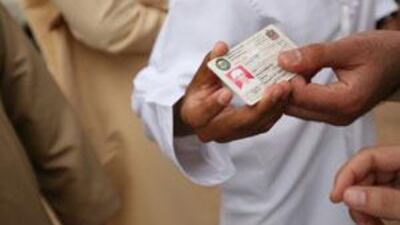DUBAI // Regular medical examinations, one-year provisional licences and intensive training courses may soon be a requirement for some motorists in the UAE. Under a proposal released yesterday by Dubai's Roads and Transport Authority (RTA), the process for training young drivers and maintaining standards for professionals would undergo sweeping changes.
Lorry, bus and taxi drivers who suffer from chronic illnesses and other health issues would be required to receive official permission to drive and to submit health examination results every five years, the RTA said in a statement. It added that drivers under 21 would fall under a provisional licensing regime mandating yearly renewal, and their vehicles would be marked with special plates. As part of an effort to boost safe-driving awareness, beginner drivers would have to take instructional courses, including simulated driving, before being given a licence.
The proposal, which was recently submitted to the Ministry of Interior, was based on a study conducted by the RTA which found that the "majority of fatal accidents were due to beginner drivers who lack sufficient driving experience". "Building on the concluded findings, a set of measures has been devised to strengthen road safety," said Mattar al Tayer, the chairman of the RTA. "These measures include introducing additional requirements to be satisfied by beginner drivers and restricting their driving freedom by denying them some of the privileges which are normally granted to experienced drivers."
The proposal is part of a continuing effort by the RTA to improve road safety, but it is unclear when the changes will come in. Previously, an RTA official said the proposals included a number of specific requirements, such as forbidding beginners from driving high-powered vehicles and banning them from motorways. However, Ahmed Bahrozyan, the chief executive of the RTA's licensing agency, which falls under the licensing department, said these particular ideas were used as examples to bolster the proposal. The specifics, such as how frequently "safe-driving" classes must be taken, had not been fully developed.
"We haven't come up with a full programme yet," he said. "But the idea behind it would be to familiarise people with safe driving, the black points, things like that." The ideas in the proposal, he added, were similar to provisional-licensing programmes in countries such as Australia and the US. Ali al Jasim, the director of the RTA drivers licensing department, said although the proposals would apply to everyone, they were intended chiefly for Emiratis.
"Expatriates are usually a bit older or families come with children who are too young to drive, but it will still apply to everyone," he said. Last month, Major Gen Mohammed al Zafein, the director of the Dubai Police traffic department, suggested that the minimum age for obtaining a licence should be lowered to 16 from 18, but only after a driver had received at least 100 hours of practical training.
Oday Rashid, the general manager of the RAK Driving Academy, believes that additional drivers' education would bring the UAE in line with western standards. "Such a system was tested in other countries and it works and really plays an important role in reducing accidents and deaths," he said. "I agree with it." * The National

